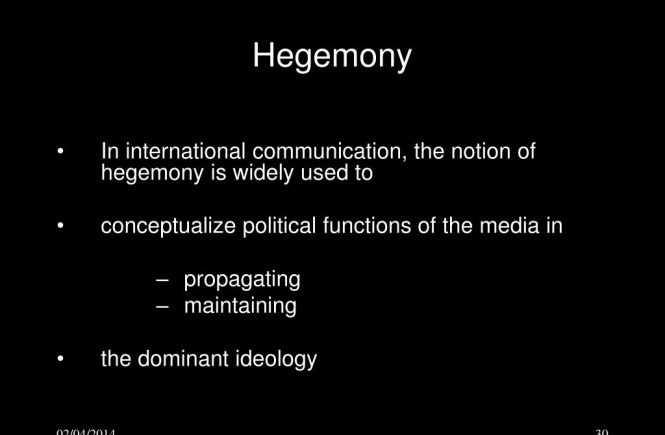By arguing that the propaganda model succeeds because there is no significant overt coercion from the state, Herman and Chomsky, in some ways, were following the European analyses of the role of ideology and state power in a capitalist society, articulated by, among others, the French Marxist Louis Althusser who called the media ‘ideological state apparatus’ (1971). Another major influence on critical theorists as well as on cultural critics in the study of ideology is the writings of Italian Marxist Antonio Gramsci (1891-1937). The impact of the ideas of Gramsci, who died in prison under the Fascist regime, has been widespread in critical studies of international communication. However, it was not until the translation into English of his most famous work, Selections from the Prison Notebooks, in 1971, that Gramsci’s ideas became a major influence in the Anglo-Saxon world. Gramsci’s conception of hegemony is rooted in the notion that the […]
Structural Imperialism
Galtung argues that the world consists of developed ‘centre’ states and underdeveloped ‘periphery’ states. In turn, each centre and periphery state possesses a ‘core’ – a highly developed area – and a less developed ‘periphery’. He defines structural imperialism as a ‘sophisticated type of dominance relation which cuts across nations basing itself on a bridgehead which the centre of the centre nation establishes in the centre of the periphery nation for the joint benefit of both’. For Galtung, there is a harmony of interest between the core of the centre nation and the centre in the periphery nation; less harmony of interest within the periphery nation than within the centre nation and a disharmony of interest between the periphery of the centre nation and the periphery of the periphery nation (Galtung, 1971: 83). In other words, there exists in the countries of the South a dominant elite whose interests coincide […]
Dependency Theory
Dependency theory emerged in Latin America in the late 1960s and 1970s, partly as a consequence of the political situation in the continent, with increasing US support for right-wing authoritarian governments, and partly with the realization among the educated elite that the developmentalist approach to international communication had failed to deliver. The establishment, in 1976, in Mexico City of the Instituto Latinamericano de Estudios (ILET), whose principal research interest was the study of transnational media business, gave an impetus to a critique of the ‘modernization’ thesis, documenting its negative consequences in the continent. The impact of ILET was also evident in international policy debates about NWICO, particularly through the work of Juan Somavia, a member of the MacBride Commission. Though grounded in the neo-Marxist political-economy approach (Baran, 1957; Gunder Frank, 1969; Amin 1976), dependency theorists aimed to provide an alternative framework to analyse international communication. Central to dependency theory was […]
Modernization Theory
Complementary to the doctrine of ‘free flow of information‘ in the post-war years was the view that international communication was the key to the process of modernization and development for the so-called ‘Third World’. Modernization theory arose from the notion that international mass communication could be used to spread the message of modernity and transfer the economic and political models of the West to the newly independent countries of the South. Communications research on what came to be known as ‘modernization’ or ‘development theory’ was based on the belief that the mass media would help transform traditional societies. This promedia bias was very influential and received support from international organizations such as UNESCO and by the governments in developing countries. One of the earliest exponents of this theory was Daniel Lerner, a political science professor at the Massachusetts Institute of Technology, whose classic work in the field, The Passing of […]
Free flow of information
Free flow of information, After the Second World War and the establishment of a bi-polar world of free market capitalism and state socialism, theories of international communication became part of the new Cold War discourse. For the supporters of capitalism, the primary function of international communication was to promote democracy, freedom of expression and markets, while the Marxists argued for greater state regulation on communication and media outlets. The concept of the ‘free flow of information’ reflected Western, and specifically US, antipathy to state regulation and censorship of the media and its use for propaganda by its communist opponents. The ‘free flow’ doctrine was essentially a part of the liberal, free market discourse that championed the rights of media proprietors to sell wherever and whatever they wished. As most of the world’s media resources and media-related capital, then as now, were concentrated in the West, it was the media proprietors […]
Approaches to Theorizing International Communication
Theories have their own history and reflect the concerns of the time in which they were developed. This chapter examines some that offer ways of approaching the subject of international communication and assesses how useful their explanations are in terms of an understanding of the processes involved. This is by no means a comprehensive account of theories of communication (see McQuail, 1994; Mattelart and Mattelart, 1998), nor does it set out an all-embracing theorization of the subject, but looks at the key theories and their proponents, which together with the preceding chapter on the history of international communication, should help to contextualize the analysis of contemporary global communication systems in subsequent chapters. It is not surprising that theories of communication began to emerge in parallel with the rapid social and economic changes of the Industrial Revolution in Europe, reflecting the significance of the role of communications in the growth of […]
